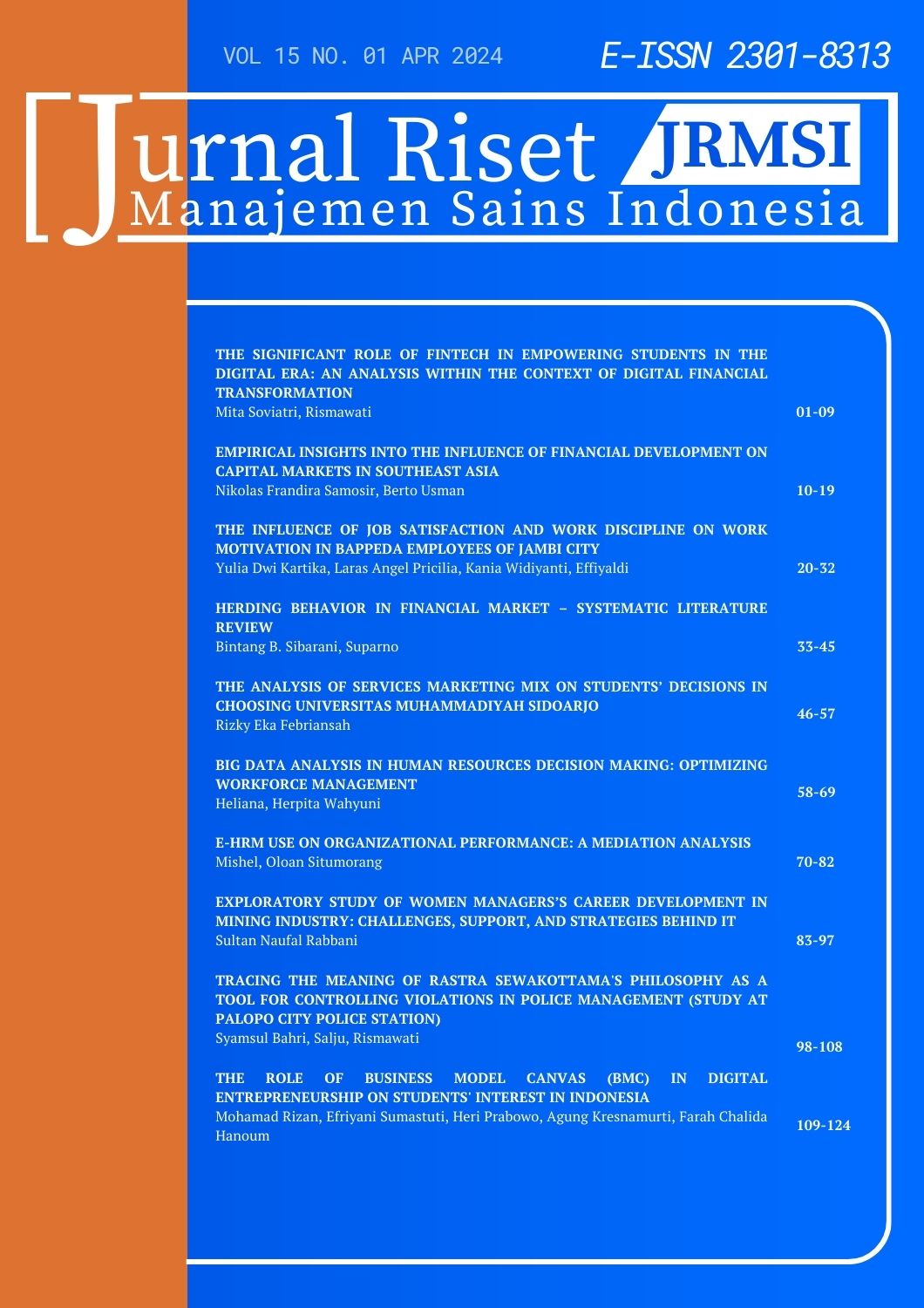EMPIRICAL INSIGHTS INTO THE INFLUENCE OF FINANCIAL DEVELOPMENT ON CAPITAL MARKETS IN SOUTHEAST ASIA
DOI:
https://doi.org/10.21009/JRMSI.015.1.02Keywords:
Financial Development; Financial Acces; Financial Efficiency; Financial Stability; Capital MarketAbstract
The rise of capital markets around the world has paved the way for new research on the relationship between financial development and capital market performance. This becomes relevant as capital markets are now more accessible to foreign capital flows as a result of economic liberalization and globalization. Therefore, this study intends to provide empirical evidence of the impact of financial development proxied by three parts, namely financial access, financial efficiency and financial stability based on critical mass theory. Operationally, this study uses a sample of 6 countries in ASEAN with an annual observation period from 2007 to 2022. With the characteristics and structure of panel data, this study uses panel regression analysis with a total data of 672 observations (country-years). The analysis used also applies a fixed-effects model (FEM) at the country (Country-FE) and year (Year-FE) levels. The results show that there is a positive association between financial access and capital market performance, a negative association between financial efficiency and capital market performance, and a positive association between financial stability and capital market performance.
References
Alan, D., & Alan Aschauer, D. (1998). Standard-Nutzungsbedingungen: Public Capital and Economic Growth: Issues of Quantity, Finance, and Efficienq. http://hdl.handle.net/10419/186907
Anadu, K., Kruttli, M., McCabe, P., & Osambela, E. (2020). The Shift from Active to Passive Investing: Potential Risks to Financial Stability? Finance and Economics Discussion Series, 2020(060r1). https://doi.org/10.17016/feds.2018.060r1
Arce, Ó., & Mayordomo, S. (2016). The Impact of the 2011 Short-Sale Ban on Financial Stability: Evidence from the Spanish Stock Market. European Financial Management, 22(5), 1001–1022. https://doi.org/10.1111/eufm.12085
Arestis, P., Demetriades, P. O., & Luintel, K. B. (2001). Financial Development and Economic Growth_ The Role of Stock Markets. Journal Of Money,Credit and Banking, Vol.33, No.1 (2001).
Baltagi, B. H. (2008). Econometric Analysis of Panel Data.
Charity, A., Odo, I. *, Idenyi, S., & Chukwuma, O. B. (2017). CAPITAL MARKET DEVELOPMENT AND ECONOMIC GROWTH IN NIGERIA. In Journal Homepage: International Journal of Physical and Social Sciences International Journal of Physical and Social Sciences (Vol. 7, Issue 2). http://www.ijmra.us,http://www.ijmra.us,http://www.ijmra.us,
Cihat, K., Setareh, K., & Salih, K. (2021). The role of financial efficiency in renewable energy demand: Evidence from OECD countries. Journal of Environmental Management, 285. https://doi.org/10.1016/j.jenvman.2021.112122
Demirguc-kunt, asli, & Klapper, leora. (2013). Measuring Financial Inclusion: Explaining Variation in Use of Financial Services across and within Countries. Brookings Paper on Economic Activity. www.worldbank.org/global
Dermiguc-Kunt, A., & Levine, R. (1996). Stock Market, Corporate Finance and Economic Growth; An Overview. The World Bank Economic Review, Vol.10, No.2, 223-239.
ECB. (2023). Financial Stability and Macroprudential Policy.
Ghedira, A., & Nakhli, M. S. (2023). Dynamic causality between oil prices and stock market indexes in Russia and China: does US financial instability matter? International Journal of Emerging Markets. https://doi.org/10.1108/IJOEM-06-2022-1018
Islam, M. S., & Alhamad, I. A. (2022). Impact of financial development and institutional quality on remmitance-growth nexus : evidence from the topmost remtitance-earning economies. Heliyon.
Kablan, S. (2021). Banking Efficiency and Financial Development in Sub-Saharan Africa. SSRN Electronic Journal. https://doi.org/10.2139/ssrn.1627071
Klagge, B., & Martin, R. (2005). Decentralized versus centralized financial systems: Is there a case for local capital markets? Journal of Economic Geography, 5(4), 387–421. https://doi.org/10.1093/jeg/lbh071
Lee, C. C., & Lee, C. C. (2023). International spillovers of U.S. monetary uncertainty and equity market volatility to China’s stock markets. Journal of Asian Economics, 84. https://doi.org/10.1016/j.asieco.2022.101575
Mertens, W., Pugliese, A., & Recker, J. (2016). Quantitative data analysis: A companion for accounting and information systems research. In Quantitative Data Analysis: A Companion for Accounting and Information Systems Research. Springer International Publishing. https://doi.org/10.1007/978-3-319-42700-3
Morgan, Peter J, Pontines, & Victor. (2014). ADBI Working Paper Series Financial Stability and Financial Inclusion Asian Development Bank Institute. www.adbi.org
Okpara, G. C. (2010). Analysis of weak form efficiency on the Nigerian stock market: Further Evidence from GARCH Model. The International Journal of Applied Economic and Finance.
Qamruzzaman, M., & Kler, R. (2022). Do financial inclusion and financial efficiency play deterministic role for FDI in Road and Belt countries. In Journal of Multinational Financial Management (Vol. 63). https://orcid.org/0000-0002-0854-2600
Saqib, N. (2018). Impact of Development and Efficiency of Financial Sector on Economic Growth: Empirical Evidence from Developing Countries. SSRN Electronic Journal. https://doi.org/10.2139/ssrn.3288737
Schelling, T. (1971). DYNAMIC MODELS OF SEGREGATIONt. In Journal of Mathematical Sociology (Vol. 1).
Schelling, T. (1974). On the Ecology of Micromotives. The Corpoorate Society. https://doi.org/doi:10.1007/978-1-349-01977-9_2
Schelling, T. (1978). Micromotives and macrobehaviors. In Public Policy. New York, United States: WW Norton & Co.
Shahbaz, M., & Rahmad, M. M. (2010). Foreign Capital Inflows-Growth Nexus and Role of Domestic Financial Sector: An ARDL Co-integration
Approach for Pakistan Foreign Capital Inflows-Growth Nexus and Role of Domestic Financial Sector: An ARDL Cointegration Approach for Pakistan. In Journal of Economic Research (Vol. 15). https://www.researchgate.net/publication/228670799
Shleifer, A., & Vishny, R. W. (1996). A Survey of Corporate Governance. NationalBureau of Economic Research.
United Nation. (2016). Issue Brief Series Digital Financial Inclusion International Telecommunication Union (ITU). http://www.un.org/esa/ffd/ffd-follow-up/inter-agency-task-force.html
Yiadom, E. B., Dziwornu, R. K., & Yalley, S. (2021). Financial inclusion, poverty and growth in Africa: can institutions help. African J. of Economic and Sustainable Development, 8(2), 91. https://doi.org/10.1504/ajesd.2021.114535
Yiadom, E. B., Mensah, Lord, & Bokpin, G. A. (2023). Environmental risk and foreign direct investment: the role of financial deepening, access and efficiency. Sustainability Accounting, Management and Policy Journal, 14(2), 369–395. https://doi.org/10.1108/SAMPJ-12-2021-0552
Zhan, M., Li, S., & Wu, Z. (2023). Can digital finance development improve balanced regional investment allocation in developing countries? The evidence from China. Emerging Market Riview.
Downloads
Published
How to Cite
Issue
Section
License

Articles in Jurnal Riset Manajemen Sains Indonesia are Open Access articles published under the Creative Commons CC BY-NC-SA License. This license permits use, distribution and reproduction in any medium for non-commercial purposes only, provided the original work and source is properly cited. Any derivative of the original must be distributed under the same license as the original.











